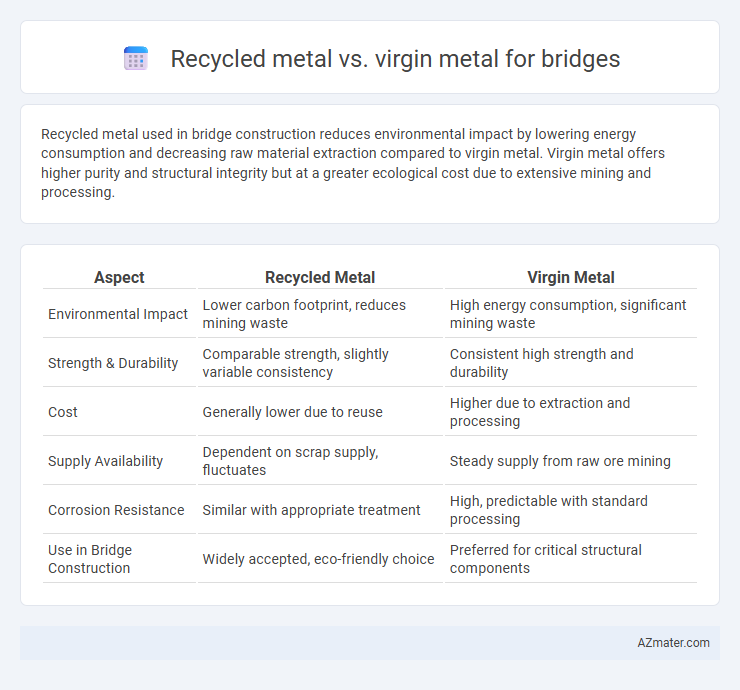Recycled metal used in bridge construction reduces environmental impact by lowering energy consumption and decreasing raw material extraction compared to virgin metal. Virgin metal offers higher purity and structural integrity but at a greater ecological cost due to extensive mining and processing.
Table of Comparison
| Aspect | Recycled Metal | Virgin Metal |
|---|---|---|
| Environmental Impact | Lower carbon footprint, reduces mining waste | High energy consumption, significant mining waste |
| Strength & Durability | Comparable strength, slightly variable consistency | Consistent high strength and durability |
| Cost | Generally lower due to reuse | Higher due to extraction and processing |
| Supply Availability | Dependent on scrap supply, fluctuates | Steady supply from raw ore mining |
| Corrosion Resistance | Similar with appropriate treatment | High, predictable with standard processing |
| Use in Bridge Construction | Widely accepted, eco-friendly choice | Preferred for critical structural components |
Introduction to Metal Use in Bridge Construction
Bridge construction heavily relies on metals such as steel and aluminum due to their strength, durability, and load-bearing capabilities. Recycled metal, sourced from industrial scrap and decommissioned structures, offers sustainable alternatives with reduced environmental impact compared to virgin metal extracted from ores. The choice between recycled and virgin metals influences not only structural performance but also lifecycle costs and carbon footprint in modern bridge engineering.
What is Recycled Metal?
Recycled metal refers to scrap metal that has been collected, processed, and melted down to produce new metal used in construction, including bridges. Using recycled metal in bridge building significantly reduces environmental impact by conserving natural resources and lowering energy consumption compared to extracting virgin metal. This sustainable alternative maintains structural integrity while promoting circular economy principles in infrastructure projects.
Defining Virgin Metal in Construction
Virgin metal in construction refers to metal extracted directly from natural ore sources, untouched by previous manufacturing or recycling processes. Its properties, including higher structural integrity and purity, often make it preferred for critical infrastructure like bridges, where material reliability is paramount. While recycled metal offers environmental benefits, virgin metal ensures consistent performance standards essential for the durability and safety of bridge components.
Environmental Impact: Recycled vs Virgin Metal
Recycled metal significantly reduces environmental impact by lowering energy consumption and decreasing greenhouse gas emissions compared to virgin metal extraction. The use of recycled metal minimizes mining activities, leading to less habitat destruction and soil erosion in bridge construction projects. Recycling metals like steel and aluminum conserves natural resources while supporting sustainable infrastructure development.
Cost Analysis: Initial and Long-Term Expenses
Recycled metal significantly reduces initial material costs for bridge construction due to lower processing and raw material expenses compared to virgin metal, which involves higher extraction and refining fees. Long-term expenses for recycled metal can optimize budget efficiency through reduced energy consumption and lower environmental compliance costs, whereas virgin metal may incur higher maintenance and lifecycle costs linked to environmental impact mitigation. Cost analysis reveals that bridges using recycled metals often achieve greater financial sustainability and resource efficiency over their operational lifetimes.
Strength and Durability Comparison
Recycled metal used in bridge construction often matches the strength of virgin metal due to advanced processing techniques that remove impurities and restore structural integrity. Virgin metal, characterized by its uniform composition and absence of prior stress, typically offers slightly higher tensile strength and fatigue resistance essential for long-span bridges. Durability of recycled metal depends heavily on quality control during recycling, whereas virgin metal consistently provides predictable performance under various environmental conditions.
Lifecycle Assessment and Sustainability
Recycled metal used in bridge construction significantly reduces environmental impact by lowering energy consumption and greenhouse gas emissions compared to virgin metal, which requires extensive mining and refining processes. Lifecycle assessment reveals that recycled metal contributes to resource conservation, decreases landfill waste, and enhances sustainability by promoting circular economy principles. Utilizing recycled metal supports long-term infrastructure sustainability by minimizing carbon footprint and conserving natural resources while maintaining structural integrity.
Availability and Supply Chain Considerations
Recycled metal offers enhanced availability due to the established networks for metal scrap collection and processing, reducing dependency on finite virgin metal ore deposits and minimizing supply chain disruptions. Virgin metal supply chains often involve extended extraction, refining, and transportation processes, leading to longer lead times and higher vulnerability to geopolitical and environmental factors. Utilizing recycled metals in bridge construction supports a more resilient and sustainable supply chain by leveraging local sources and decreasing the carbon footprint associated with raw material procurement.
Regulatory and Certification Standards
Recycled metal used in bridge construction must comply with rigorous regulatory standards such as ASTM A6 and ISO 14001 to ensure structural integrity and environmental sustainability. Virgin metal typically meets foundational certifications like ASTM A36 and API standards, providing a baseline for strength and durability. Both materials require compliance with local building codes and third-party certification bodies to guarantee performance under load and resistance to corrosion.
Conclusion: Choosing the Right Metal for Bridges
Selecting recycled metal for bridges reduces environmental impact by lowering energy consumption and raw material extraction while maintaining comparable strength and durability to virgin metal. Virgin metal, though often preferred for unmatched purity and consistency, involves higher carbon emissions and resource depletion. Balancing sustainability goals with structural performance, recycled metal represents a viable, eco-friendly alternative that meets safety standards in modern bridge construction.

Infographic: Recycled metal vs Virgin metal for Bridge
 azmater.com
azmater.com